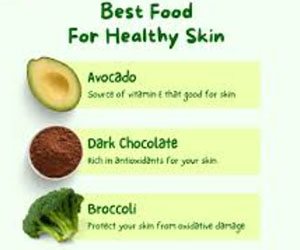
Your skin is the greatest organ in your body and it need specific nutritional support to remain vibrant, resilient, and youthful. While skincare products have a purpose, true transformation occurs from inside. If you want excellent skin health, not simply average, you must be mindful of what you feed your body. The following guide is full of straight and comprehensive aspects of the most effective nutrients you should include in your diet to promote vibrant and healthy skin.
1. Vitamin C – The Collagen Commander
Vitamin C is not optional. It is vitally necessary for the production of collagen, the structural protein that maintains your skin tight and elastic. Without enough vitamin C, collagen formation slows, resulting in sagging skin, dullness, and premature wrinkles.
Benefits of Vitamin C
- Boosts collagen synthesis.
- Antioxidants neutralize free radicals.
- Brightens skin tone.
- Speeds up wound healing.
Sources of Vitamin C
- Red bell peppers.
- Kiwi.
- Strawberries.
- Citrus fruits (oranges, lemons, grapefruits).
- Broccoli.
Take Vitamin C with bioflavonoids (found in citrus) to increase absorption.
2. Vitamin E – The Cellular Shield
Vitamin E is the skin’s first line of protection against oxidative stress. It protects cell membranes from external contaminants, UV radiation, and internal inflammation.
Benefits of Vitamin E
- Prevents cell membrane damage.
- Improves skin moisture retention.
- Reduces UV-induced skin damage.
- Addresses aging signs.
Sources of Vitamin E
- Almonds.
- Sunflower seeds.
- Avocados.
- Spinach.
- Wheat germ oil.
Combine vitamin E with vitamin C; they act together to improve antioxidant protection.
3. Omega-3 Fatty Acids
Omega-3 aren’t negotiable. These necessary fatty acids help to maintain the skin’s lipid barrier which keeps moisture in and irritants out. A deficiency causes dry, itchy, and inflammatory skin.
Benefits of Omega-3 Fatty Acids
- Reduces inflammation in acne, eczema, and psoriasis.
- Boosts hydration.
- Strengthens skin cell membranes.
- Improves elasticity.
Sources of Omega-3 Fatty Acids
- Fatty fish (salmon, mackerel, sardines).
- Chia seeds.
- Walnuts.
- Flaxseeds.
- Algal oil for plant-based omega-3s.
Aim for at least 250 – 500 mg of EPA and DHA each day for noticeable results.
4. Zinc
Zinc is essential for skin healing, inflammation reduction, and regulating oil production. If you have acne or frequently experience skin irritations, you should be aware of this trace mineral.
Benefits of Zinc
- Regulates sebum production.
- Reduces acne breakouts.
- Improves wound healing.
- Provides UV protection.
Sources of Zinc
- Pumpkin seeds.
- Chickpeas.
- Oysters.
- Lentils.
- Cashews.
Zinc competes with iron and calcium for absorption, keep it away from heavy meals or supplements containing these minerals.
5. Vitamin A
Vitamin A is essential for skin regeneration and maintenance. It is necessary for the turnover of skin cells and the avoidance of blocked pores. Both dietary vitamin A and its derivative, retinol, are powerful skincare ingredients.
Benefits of Vitamin A
- Boosts cell turnover.
- Prevents acne.
- Preserves skin structure and integrity.
- Reduces pigmentation.
Sources of Vitamin A
- Sweet potatoes.
- Carrots.
- Kale.
- Liver.
- Eggs.
Consume vitamin A with healthy fats to improve absorption.
6. Selenium
Selenium acts on the DNA level, protecting skin cells from oxidative stress and cellular mutation. This is especially crucial for lowering the risk of skin cancer and preserving youthful skin over time.
Benefits of Selenium
- Neutralizes free radicals.
- Supports skin suppleness.
- Reduces inflammation.
- Protects against UV damage.
Sources of Selenium
- Brazil nuts (just 1 – 2 per day covers your needs).
- Tuna.
- Eggs.
- Brown rice.
- Sunflower seeds.
Don’t take too much selenium. High amounts might be harmful. Unless otherwise directed, consume only natural foods.
7. Biotin (Vitamin B7)
Biotin is essential for maintaining the structural integrity of skin, hair, and nails. A deficiency can cause dry, flaky skin, dermatitis, and hair loss.
Benefits of Biotin
- Improves skin moisture and smoothness.
- Reduces scaling and flakiness.
- Promotes fat metabolism which is crucial for skin cell health.
Sources of Biotin
- Egg yolks.
- Almonds.
- Cauliflower.
- Mushrooms.
- Whole grains.
Avoid eating raw egg whites in large quantities because they contain avidin which inhibits biotin absorption.
8. Polyphenols
Polyphenols are plant chemicals that possess strong antioxidant and anti-inflammatory activities. They prevent UV damage, slow aging, and improve skin tone and texture.
Benefits of Polyphenols
- Prevent oxidative damage.
- Boost skin circulation.
- Reduce pigmentation.
- Promote collagen and elastin formation.
Sources of Polyphenols
- Green tea; especially matcha.
- Dark chocolate (minimum 70% cacao).
- Berries (blueberries, raspberries).
- Olive oil.
Drink green tea on a daily basis for catechins that improve skin such as EGCG.
9. Water
Even the greatest nutrients are ineffective if not properly hydrated. Water is necessary for maintaining skin suppleness, eliminating pollutants, and efficiently delivering nutrients to cells.
Benefits of Water
- Prevents dryness and flaking.
- Improves nutrition transport.
- Increases skin plumpness and glow.
- Reduces puffiness and inflammation.
How Much Water is Good for Health?
- Aim for 2.5 to 3 liters everyday.
- Adjust for activity and hot weather.
For added detoxification advantages, infuse your water with cucumber, lemon, or mint.
10. Protein
Skin is primarily composed of protein-collagen, elastin, and keratin. Your skin will suffer if you don’t get enough protein, regardless of how clean your diet is.
Benefits of Protein
- Promotes collagen and elastin formation.
- Helps with skin repair.
- Prevents sagging and dullness.
Sources of Protein
- Lean poultry.
- Fish.
- Tofu and tempeh.
- Greek yogurt.
- Beans and legumes.
To receive all of the needed amino acids, eat complete proteins or combine them with plant proteins.
Cosmetics can’t be used to pretend to have healthy skin. Your daily nutrient intake should be planned and regular. Optimal skin health necessitates a nutrient-dense diet that provides hydration, antioxidant protection, cellular regeneration, and structural support. Avoid skin-depleting habits such as processed sugar, smoking, and excessive UV exposure. Instead, make your plate the most effective skincare product.

Leave a Reply